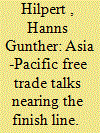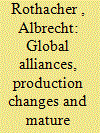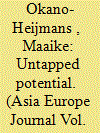|
|
|
Sort Order |
|
|
|
Items / Page
|
|
|
|
|
|
|
| Srl | Item |
| 1 |
ID:
138926


|
|
|
|
|
| Summary/Abstract |
Asia is not only the world’s most dynamic region in terms of trade, it is also an important pacesetter in trade policy. The USA is currently negotiating with 11 partner countries over a Trans-Pacific Partnership (TPP); the members of the ASEAN+6 group are in talks over a Regional Comprehensive Economic Partnership (RCEP), while Japan, China and Korea are conducting trilateral trade negotiations (China-Japan-Korea Free Trade Agreement (CJK FTA)). The multilateral structures emerging from all these initiatives could, in the long term, be combined into a Free Trade Area of the Asia-Pacific (FTAAP). What are the motives behind these agreements? What are their chances of being implemented? When it comes to the trade and geopolitical power struggle that encompasses these talks, does the USA or China have the upper hand? And what role remains for Europe’s trade policy?
|
|
|
|
|
|
|
|
|
|
|
|
|
|
|
|
| 2 |
ID:
138922


|
|
|
|
|
| Summary/Abstract |
The article reviews the changes in production, investment and trade patterns which have affected Japanese car exports to the EU and their foreign direct investments (FDI) in Europe. Global manufacturing alliances with shared productions and global component sourcing with lean production for most makers have changed the classical trading and FDI patterns beyond recognition. As a result, the trade policy instruments of old have lost most of their meaning and relevance. The abolition of EU import tariffs on Japanese cars in the context of the forthcoming foreign trade association (FTA) with Japan will hence in all likeliness have only a minimal impact on future trade and investment in the sector.
|
|
|
|
|
|
|
|
|
|
|
|
|
|
|
|
| 3 |
ID:
138924


|
|
|
|
|
| Summary/Abstract |
Observers of Asian-Pacific regional integration often neglect three decades of ‘deepening’ coordination between the Australian and New Zealand economies. In doing so, they overlook one path by which ideas about economic integration have travelled from Europe to the Asia Pacific. This article demonstrates how Australasian policymakers reacted to and learned from European experience in constructing Closer Economic Relations (CER) and the trans-Tasman single economic market. It also explains how they adapted these ideas to local circumstances and, in doing so, constructed an ‘outward-looking’ alternative to European precedent. Australasian policymakers have subsequently propagated their experience as a distinct ‘model’ of regional economic integration in Southeast Asia, the Asia Pacific and beyond. Observing the movement of ideas about economic integration from Europe to the Asia Pacific by diffusion and design presents a novel perspective on the inter-relationship of integration projects across regions and how observers might compare processes of ‘deep’ economic integration.
|
|
|
|
|
|
|
|
|
|
|
|
|
|
|
|
| 4 |
ID:
138923


|
|
|
|
|
| Summary/Abstract |
The western Balkans as a region is at the crossroads of the east-west energy transportation routes, and it is confronted with the simultaneous tasks of transforming its economic outlook and its energy infrastructure: a process that creates unique opportunities as well as challenges. By confronting these challenges and making the best use of its opportunities through sound decision-making, the region could significantly improve energy security. The transformation of the dynamics of energy security in the western Balkans is an opportunity not only for the region but also for the countries like Turkey, which is rapidly becoming an important player in the east-west energy supply corridor. While much of the literature focused on energy security and the region has explored its relations with Russia and the EU, this article expands and enhances knowledge of this topical subject by exploring the highly important position Turkey occupies in the region’s energy security dynamics. For reasons both specific to Turkey and to its particular sets of interconnected relationships with the EU and Russia, the article demonstrates that Turkey is uniquely situated to contribute to energy security in the western Balkans. The major aim of this study is thus to provide a clear understanding of Turkey’s energy policy in the western Balkans in light of its own relations with the two key players of EU and Russia, as well as its particular domestic-level characteristics. The fundamental argument is that Ankara, with its proactive diplomacy and advanced bilateral partnerships with Russia and the EU, is particularly positioned to contribute—and has the capacity to continue to contribute—to the future of energy security in the western Balkans.
|
|
|
|
|
|
|
|
|
|
|
|
|
|
|
|
| 5 |
ID:
138919


|
|
|
|
|
| Summary/Abstract |
In 2008, the European Union (EU) decided to include aviation in its Emissions Trading System (ETS) in order to realize emissions reductions in the aviation sector. However, the unilateral measure has triggered strong opposition from various actors, and now, the EU finds itself in the middle of a substantial power struggle about the creation of a global scheme for international aviation emissions reduction. China plays an important role as it has not only banned its airlines from complying with the EU ETS, but also implemented economic retaliatory measures, such as freezing orders of new European Airbus aircraft. Consequently, Beijing could successfully form coalitions with other countries to dilute international negotiations at the International Civil Aviation Organization (ICAO) assembly in 2013. The study reveals the hardships that the establishment of a global carbon emissions reduction scheme for aviation faces. It discusses the leading role of the EU on the issue, and provides a general assessment of possible responses to the aviation directive. It then analyzes China’s position on the inclusion of aviation under a global carbon reduction scheme. Finally, the study provides a prospect on how to overcome the diplomatic struggle in order to achieve concrete carbon emission reductions in aviation. As the study concludes, the EU and the rest of the world would be better off by refraining from unilateral mitigation measures and emphasizing more involvement, engagement, and capacity building in negotiating a possible carbon reduction scheme at the international level.
|
|
|
|
|
|
|
|
|
|
|
|
|
|
|
|
| 6 |
ID:
138921


|
|
|
|
|
| Summary/Abstract |
In its early period of statehood, Australia was strongly attached politically and economically to Britain up until late 1940s for reasons of history. With a new geo-political scenario after 1945, Australia changed its foreign policy priorities as well as its preferred trading partners. A multitude of new markets emerged on the Australian landscape such as Japan and in more recent times China which in 2012 became Australia’s number one trading partner. For decades, Italy and Australia were often at loggerheads in geo-political events. What brought them together to become partners was the medium of Italian migration for a need Australian economy. Sometimes, this association is stretched to levels which the relationship never endured and especially not in engagement in trade or economic transfers. The perception that Italy might be a key economic partner was never the case, and evidence bears this out. However, the myth, possibly created from among the large Italian community in Australia, of a ‘special’ economic relationship between these two nations and economies continued to persist. The reality of Australia’s economic relations with Italy tells another story. This paper seeks to demonstrate that there was nothing special in this trade relationship which was as common as any other.
|
|
|
|
|
|
|
|
|
|
|
|
|
|
|
|
| 7 |
ID:
138925


|
|
|
|
|
| Summary/Abstract |
This policy brief assesses the operations of the Asian Development Bank (ADB) and provides an analysis of the Bank’s relevance for its European member countries today and tomorrow. One important reason for Europe’s 17 member countries to engage with the ADB lies in the Bank’s contributions to a prosperous, stable and more integrated Asia-Pacific. The ADB positively contributes to European countries’ economic diplomacy and offers valuable opportunities to reinforce ties with players that are quickly strengthening their role and influence in global politics and economics. Furthermore, the Bank’s non-Western diplomatic style provides lessons on how to operate successfully in tomorrow’s world, wherein Europe will be less influential. European countries would do well to strengthen their engagement with the ADB and assist the Bank in maintaining legitimacy and relevance towards the future.
|
|
|
|
|
|
|
|
|
|
|
|
|
|
|
|
| 8 |
ID:
138920


|
|
|
|
|
| Summary/Abstract |
Ever since, Goldman Sachs coined the term BRICS academics, and policy makers have struggled to come to terms with the effects and the impact of rising powers on world politics. The German government has tried to stay abreast of the changing global power dynamics by entering the so-called strategic partnerships with China and India, as well as aiming for a more systematic approach towards rising powers as laid out in the ‘Gestaltungsmaechtekonzept’ (transformative powers concept) published under the Merkel government in 2012. Against this background, this article inquires on the depth and scope of Germany’s strategic partnerships towards Asia’s rising powers. It finds that despite new institutional developments such as intergovernmental consultations at ministerial level, the strategic partnerships with Delhi and Berlin are still lacking in substance due to a discrepancy of policy preferences and interests in a variety of policy fields.
|
|
|
|
|
|
|
|
|
|
|
|
|
|
|
|
|
|
|
|
|